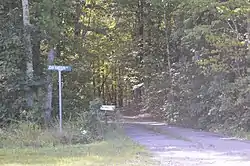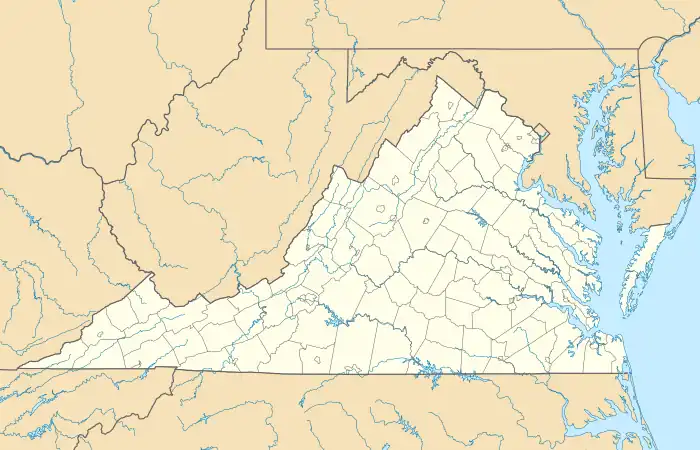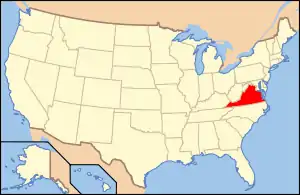Roanoke Plantation | |
 Entrance to the property | |
  | |
| Location | W of Saxe off VA 746, near Saxe, Virginia |
|---|---|
| Coordinates | 36°54′45″N 78°42′50″W / 36.91250°N 78.71389°W |
| Area | 926 acres (375 ha) |
| NRHP reference No. | 73002002[1] |
| VLR No. | 019-0029 |
| Significant dates | |
| Added to NRHP | April 11, 1973 |
| Designated VLR | September 19, 1972[2] |
Roanoke Plantation is a historic plantation house located near Saxe, Charlotte County, Virginia. The property includes two cottages and a smokehouse. The first cottage is a simple one-story, three-bay structure with exterior-end brick chimneys. It has a steep gable roof. The second cottage is a two-room, gable-end-front frame structure. It was the home of U.S. Congressman and Senator John Randolph (1773–1833).[3]
More than 300 enslaved men, women, and children were manumitted their freedom in Senator Randolph's will and were to inherit thousands of acres of fertile farmland in Mercer County, Ohio. Upon his death in 1833, his will was contested, and the plantation workers did not gain their freedom for another 13 years. Once they were finally free, they first attempted to relocate to Mercer County, Ohio where land had been bought for them by the provisions of the will and included at least ten acres of land for every man over 40 years of age. Armed, racist white settlers refused them. The freedmen would ultimately scatter and settle into smaller communities across Ohio. Notable descendants include James P. Humphrey, Sidney's first black mayor.[4]
It was listed on the National Register of Historic Places in 1973.[1]
References
- 1 2 "National Register Information System". National Register of Historic Places. National Park Service. July 9, 2010.
- ↑ "Virginia Landmarks Register". Virginia Department of Historic Resources. Retrieved 5 June 2013.
- ↑ Virginia Historic Landmarks Commission Staff (August 1972). "National Register of Historic Places Inventory/Nomination: Roanoke Plantation" (PDF). Virginia Historic Landmarks Commission. and Accompanying photo
- ↑ Humphrey, Jim and Rich Wallace. "Randolph Slaves." Shelby County Historical Society. February 1997. http://www.shelbycountyhistory.org/schs/archives/blackhistoryarchives/randolphbhisA.htm

